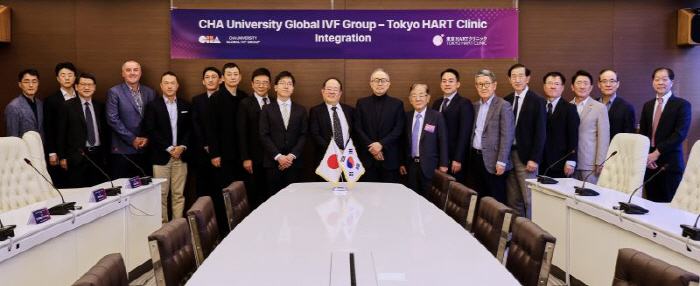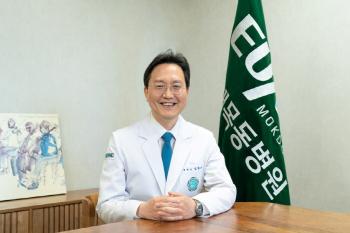Cha Hospital enters Japan for the first time in Korea's fertility center...First treatment of stem cells in infertility
Apr 29, 2025
Cha Medical University Cha Hospital entered Japan for the first time as a domestic infertility center by incorporating the HART Clinic, a large Japanese infertility center that treats 1,200 infertile patients annually. In addition, it was announced that for the first time in Japan, stem cell therapy will be performed simultaneously for infertility. To this end, it has signed a (business integration) contract with Heart Clinic.
At the signing ceremony, Cha Kwang-ryul Cha Hospital and BioGlobal representatives from Cha Hospital, including Group Global Research Institute Director, Cha Medical University President Lee Sang-tae, Cha Biotech Vice President Choi Seok-yoon, Cha Biotech Medical Center Director Yoon Do-heum, Cha Healthcare CEO Yoon Kyung-wook, Cha Biotech Overseas Business Head Han Ki-won, Heart Clinic Director Oka Chikahiro, Heart Clinic Vice President Oka Kazuhiko, Australian Tea Hospital CEO Adnan Katakovic, Singapore Medical Group CEO Tec Liang Ben and Cha Healthcare Singapore CEO Jeong Min-soo all attended.
According to the Korea Insurance Research Institute, one in four Japanese couples has experience in infertility treatment, and the demand for egg freezing by unmarried women is steadily increasing. In order to reduce the economic burden of infertility procedures, insurance products that guarantee infertility treatment costs in Japan are also actively being developed. However, the average pregnancy success rate for infertility treatment in Japan is about 23%. Cha Hospital plans to increase the success rate of pregnancy by combining Cha Hospital's infertility technology and cell therapy. In particular, in collaboration with Cha Biotech's R&D Group, it plans to provide parallel treatment using various stem cells for infertile women aged 35 or older. This is expected to be the first case of direct injection and procedure of stem cells into ovaries in Korea and Japan as well as around the world.
Cha Hospital has already conducted various cell therapy clinical studies on infertility treatment. A number of autologous platelet-rich plasma injection (PRP) procedures have been successfully performed to solve the problem of ovaries. PRP contains various types of growth factors and is known as a regenerative therapy involved in remodeling the extracellular matrix and differentiation and proliferation of stem cells. Based on this successful experience, Cha Hospital plans to continue full-fledged stem cell treatment in Japan, where stem cell treatment clinical trials are relatively easy.
"Japan shows differences in infertility and cell therapy from Korea in government regulations and is flexible," said Cha Soo-yeon, president of R&D at Cha Biotech. "We will not only increase the success rate of pregnancy by incorporating stem cell therapy into infertility, but also develop new research papers and technologies."
Director Hart Clinic Oka said, `We expect to provide more benefits and joy to Japanese patients through cooperation with the Cha Hospital.'"We will do our best to ensure that the two organizations will cooperate to produce global results in the future."," he said.
At the signing ceremony, Cha Kwang-ryul Cha Hospital and BioGlobal representatives from Cha Hospital, including Group Global Research Institute Director, Cha Medical University President Lee Sang-tae, Cha Biotech Vice President Choi Seok-yoon, Cha Biotech Medical Center Director Yoon Do-heum, Cha Healthcare CEO Yoon Kyung-wook, Cha Biotech Overseas Business Head Han Ki-won, Heart Clinic Director Oka Chikahiro, Heart Clinic Vice President Oka Kazuhiko, Australian Tea Hospital CEO Adnan Katakovic, Singapore Medical Group CEO Tec Liang Ben and Cha Healthcare Singapore CEO Jeong Min-soo all attended.
According to the Korea Insurance Research Institute, one in four Japanese couples has experience in infertility treatment, and the demand for egg freezing by unmarried women is steadily increasing. In order to reduce the economic burden of infertility procedures, insurance products that guarantee infertility treatment costs in Japan are also actively being developed. However, the average pregnancy success rate for infertility treatment in Japan is about 23%. Cha Hospital plans to increase the success rate of pregnancy by combining Cha Hospital's infertility technology and cell therapy. In particular, in collaboration with Cha Biotech's R&D Group, it plans to provide parallel treatment using various stem cells for infertile women aged 35 or older. This is expected to be the first case of direct injection and procedure of stem cells into ovaries in Korea and Japan as well as around the world.
Cha Hospital has already conducted various cell therapy clinical studies on infertility treatment. A number of autologous platelet-rich plasma injection (PRP) procedures have been successfully performed to solve the problem of ovaries. PRP contains various types of growth factors and is known as a regenerative therapy involved in remodeling the extracellular matrix and differentiation and proliferation of stem cells. Based on this successful experience, Cha Hospital plans to continue full-fledged stem cell treatment in Japan, where stem cell treatment clinical trials are relatively easy.
"Japan shows differences in infertility and cell therapy from Korea in government regulations and is flexible," said Cha Soo-yeon, president of R&D at Cha Biotech. "We will not only increase the success rate of pregnancy by incorporating stem cell therapy into infertility, but also develop new research papers and technologies."
Director Hart Clinic Oka said, `We expect to provide more benefits and joy to Japanese patients through cooperation with the Cha Hospital.'"We will do our best to ensure that the two organizations will cooperate to produce global results in the future."," he said.
|
This article was translated by Naver AI translator.














